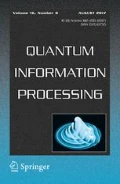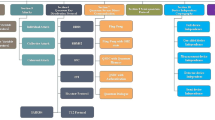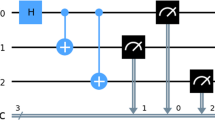Abstract
As an important branch of quantum cryptography, quantum private comparison (QPC) has recently received a lot of attention. In this paper we study the security of previous QPC protocols with a semi-honest third party (TP) from the viewpoint of secure multi-party computation and show that the assumption of a semi-honest TP is unreasonable. Without the unreasonable assumption of a semi-honest TP, one can easily find that the QPC protocol (Tseng et al. in Quantum Inf Process, 2011, doi:10.1007/s11128-011-0251-0) has an obvious security flaw. Some suggestions about the design of QPC protocols are also given.
Similar content being viewed by others
References
Bennett, C.H., Brassard, G.: Quantum cryptography: public-key distribution and coin tossing. In: Proceedings of the IEEE International Conference on Computers, Systems and Signal Processing, pp. 175–179. IEEE, New York (1984)
Ekert A.: Quantum cryptography based on Bell’s theorem. Phys. Rev. Lett. 67, 661–664 (1991)
Bennett C.H.: Quantum cryptography using any two nonorthogonal states. Phys. Rev. Lett. 68, 3121–3124 (1992)
Boström K., Felbinger T.: Deterministic secure direct communication using entanglement. Phys. Rev. Lett. 89, 187902 (2002)
Deng F.G., Long G.L., Liu X.S.: Two-step quantum direct communication protocol using the Einstein-Podolsky-Rosen pair block. Phys. Rev. A 68, 042317 (2003)
Lin S., Wen Q.Y., Gao F., Zhu F.C.: Quantum secure direct communication with chi-type entangled states. Phys. Rev. A 78, 064304 (2008)
Wang T.-Y., Wen Q.-Y., Zhu F.-C.: Multiparty controlled quantum secure direct communication with phase encryption. Int. J. Quant. Inform. 9(2), 801–807 (2011)
Yang Y.-G., Wen Q.-Y.: Threshold quantum secure direct communication without entanglement. Sci. Chin. Ser. G Phys. Astron. 51(2), 176–183 (2008)
Cao W.-F., Yang Y.-G., Wen Q.-Y.: Quantum secure direct communication with cluster states. Sci. Chin. Ser. G Phys. Astron. 53(7), 1271–1275 (2010)
Hillery M., Bužek V., Berthiaume A.: Quantum secret sharing. Phys. Rev. A 59, 1829–1834 (1999)
Karlsson A., Koashi M., Imoto N.: Quantum entanglement for secret sharing and secret splitting. Phys. Rev. A 59, 162–168 (1999)
Guo G.P., Guo G.C.: Quantum secret sharing without entanglement. Phys. Lett. A 310, 247–251 (2003)
Zhang Z.J., Man Z.X.: Multiparty quantum secret sharing of classical messages based on entanglement swapping. Phys. Rev. A 72, 022303 (2005)
Lin S., Wen Q.Y., Qin S.J.: Multiparty quantum secret sharing with collective eavesdropping-check. Opt. Commun. 282, 4455–4459 (2009)
Wang T.Y., Wen Q.Y., Gao F., Lin S., Zhu F.C.: Cryptanalysis and improvement of multiparty quantum secret sharing schemes. Phys. Lett. A 373, 65–68 (2008)
Li B.-K., Yang Y.-G., Wen Q.-Y.: Threshold quantum secret sharing of secure direct communication. Chin. Phys. Lett. 26(1), 010302 (2009)
Yang Y.-G., Wang Y., Chai H.-P., Teng Y.-W., Zhang H.: Member expansion in quantum (t,n) threshold secret sharing schemes. Opt. Commun. 284(13), 3479–3482 (2011)
Yang Y.-G., Wang Y., Teng Y.-W., Wen Q.-Y.: Universal three-party quantum secret sharing against collective noise. Commun. Theor. Phys. 55(4), 589–593 (2011)
Yang Y.-G., Chai H.-P., Wang Y., Teng Y.-W., Wen Q.-Y.: Fault tolerant quantum secret sharing against collective-amplitude-damping noise. Sci. Chin. Ser. G Phys. Astron. 54(9), 1619–1624 (2011)
Yang Y.-G., Teng Y.-W., Chai H.-P., Wen Q.-Y.: Verifiable quantum (k,n)-threshold secret key sharing. Int. J. Theor. Phys. 50(3), 792–798 (2011)
Yang Y.-G., Teng Y.-W., Chai H.-P., Wen Q.-Y.: Fault tolerant quantum secret sharing against collective noise. Phys. Scr. 83(2), 025003 (2011)
Yang, Y.-G., Wen, Q.-Y.: Comment on: “Efficient high-capacity quantum secret sharing with two-photon entanglement”. Phys. Lett. A 373(3), 396–398 [Phys. Lett. A 372, 1957 (2008)] (2009)
Yang Y.-G., Wen Q.-Y.: Threshold multiparty quantum-information splitting via quantum channel encryption. Int. J. Quantum Inf. 7(6), 1249–1254 (2009)
Sun Y., Wen Q.Y., Zhu F.C.: Improving the multiparty quantum secret sharing over two collective-noise channels against insider attack. Opt. Commun. 283, 181–183 (2010)
Lin S., Wen Q.Y., Gao F., Qin S.J.: Improving the security of multiparty quantum secret sharing based on the improved Bostrom-Felbinger protocol. Opt. Commun. 281, 4553–4554 (2008)
Qin S.J., Gao F., Wen Q.Y., Zhu F.C.: A special attack on the multiparty quantum secret sharing of secure direct communication using single photons. Opt. Commun. 281, 5472–5474 (2008)
Sun Y., Wen Q.Y., Gao F.: Multiparty quantum secret sharing based on Bell measurement. Opt. Commun. 282, 3647–3651 (2009)
Dušek M., Haderka O., Hendrych M.: Quantum identification system. Phys. Rev. A 60, 149–156 (1999)
Curty M., Santos D.J.: Quantum authentication of classical messages. Phys. Rev. A 64, 062309 (2001)
Ljunggren D., Bourennane M., Karlsson A.: Authority-based user authentication in quantum key distribution. Phys. Rev. A 62, 022305 (2000)
Yang Y.-G., Zhou Z., Teng Y.-W., Wen Q.-Y.: Arbitrated quantum signature with an untrusted arbitrator. Eur. Phys. J. D 61(3), 773–778 (2011)
Yang Y.-G., Wen Q.-Y.: Arbitrated quantum signature of classical messages against collective amplitude damping noise. Opt. Commun. 283(16), 3198–3201 (2010)
Yang Y.-G., Wang Y., Wen Q.-Y.: Scalable arbitrated quantum signature of classical messages with multi-signers. Commun. Theor. Phys. (Beijing, China) 54(1), 84–88 (2010)
Yang Y.-G., Wen Q.-Y.: Economical multiparty simultaneous quantum identity authentication based on Greenberger-Horne-Zeilinger states. Chin. Phys. B 18(8), 3233–3236 (2009)
Yang Y.-G., Teng Y.W., Chai H.P., Wen Q.-Y.: Verifiable quantum (k,n)-threshold secret key sharing. Int. J. Theor. Phys. 50(3), 792–798 (2011)
Yang, Y.-G., Jia, X., Wang, H. Y., Zhang, H.: Verifiable quantum (k, n)-threshold secret sharing. Quantum Inf. Process. (2012). doi:10.1007/s11128-011-0323-1
Abadi M., Feigenbaum J.: A simple protocol for secure circuit evaluation. LNCS 294, 264–272 (1987)
Yao, A.C.: Protocols for secure computations. In: Proceedings of 23rd IEEE Symposium on Foundations of Computer Science (FOCS’ 82), p. 160. Washington, DC, USA (1982)
Boudot F., Schoenmakers B., Traor’e J.: A fair and efficient solution to the socialist millionaires’ problem. Discr. Appl. Math. (Special Issue on Coding and Cryptology) 111(1–2), 23–36 (2001)
Lo H.K.: Insecurity of quantum secure computations. Phys. Rev. A 56(2), 1154–1162 (1997)
Yang Y.G., Wen Q.Y.: An efficient two-party quantum private comparison protocol with decoy photons and two-photon entanglement. J. Phys. A: Math. Theor. 42(5), 055305 (2009)
Yang Y.G., Cao W.F., Wen Q.Y.: Secure quantum private comparison. Phys. Scr. 80(6), 065002 (2009)
Chen X.B., Xu G., Niu X.X., Wen Q.Y., Yang Y.X.: An efficient protocol for the private comparison of equal information based on the triplet entangled state and single particle measurement. Opt. Commun. 283(7), 1561–1565 (2010)
Tseng H.-Y., Lin J., Hwang T.: New quantum private comparison protocol using EPR pairs. Quantum Inf. Process. 11(2), 373–384 (2012)
Liu W., Wang Y.B., Tao J.Z.: An efficient protocol for the quantum private comparison of equality with W state. Opt. Commun. 284, 1561–1565 (2011)
Liu W., Wang Y.B., Tao J.Z., Cao Y.Z.: A protocol for the quantum private comparison of equality with χ-type state. Int. J. Theor. Phys. 51, 69–77 (2012)
Liu W., Wang Y.B., Jiang Z.T., Cao Y.Z., Cui W.: New quantum private comparison protocol using χ-type state. Int. J. Theor. Phys. 51(6), 1953–1960 (2012)
Jia H.Y., Wen Q.Y., Li Y.B., Gao F.: Quantum private comparison using genuine four-particle entangled states. Int. J. Theor. Phys. 51(4), 1187–1194 (2012)
Jia H.Y., Wen Q.Y., Song T.T., Gao F.: Quantum protocol for millionaire problem. Opt. Commun. 284, 545–549 (2011)
Gao F., Guo F.Z., Wen Q.Y., Zhu F.C.: Comment on “Experimental demonstration of a quantum protocol for byzantine agreement and liar detection”. Phys. Rev. Lett. 101, 208901 (2008)
Zhang, Y.S., Li, C.F., Guo, G.C.: Comment on “Quantum key distribution without alternative measurements”. Phys. Rev. A 63, 036301 [Phys. Rev. A 61, 052312 (2000)] (2001)
Gao F., Qin S., Wen Q., Zhu F.: A simple participant attack on the Bradler-Dusek protocol. Quantum Inf. Comput. 7, 329–334 (2007)
Gao F., Wen Q., Zhu F.: Teleportation attack on the QSDC protocol with a random basis and order. Chin. Phys. B 17, 3189–3193 (2008)
Gao F., Qin S., Guo F., Wen Q.: Dense-Coding Attack on Three-Party Quantum Key Distribution Protocols. IEEE J. Quantum Electron. 47, 630–635 (2011)
Hao L., Li J.L., Long G.L.: Eavesdropping in a quantum secret sharing protocol based on Grover algorithm and its solution. Sci. China Phys. Mech. Astron. 53, 491–495 (2010)
Qin S., Gao F., Wen Q., Zhu F.: Improving the security of multiparty quantum secret sharing against an attack with a fake signal. Phys. Lett. A 357, 101–103 (2006)
Wójcik A.: Eavesdropping on the “Ping-Pong” quantum communication protocol. Phys. Rev. Lett. 90, 157901 (2003)
Wójcik A.: Comment on “Quantum dense key distribution”. Phys. Rev. A 71, 016301 (2005)
Cai Q.Y.: The “Ping-Pong” protocol can be attacked without eavesdropping. Phys. Rev. Lett. 91, 109801 (2003)
Gao F., Guo F.Z., Wen Q.Y., Zhu F.C.: Consistency of shared reference frames should be reexamined. Phys. Rev. A 77, 014302 (2008)
Gao, F., Wen, Q.Y., Zhu, F.C.: Comment on: “Quantum exam”. Phys. Lett. A 360, 748–750 [Phys. Lett. A 350 (2006) 174] (2007)
Gao F., Lin S., Wen Q.Y., Zhu F.: A special eavesdropping on one-sender versus N-receiver QSDC protocol. Chin. Phys. Lett. 25, 1561–1563 (2008)
Gao F., Qin S., Wen Q., Zhu F.: Cryptanalysis of multiparty controlled quantum secure direct communication using Greenberger-Horne-Zeilinger state. Opt. Commun. 283, 192–195 (2010)
Yang Y.-G., Naseri M., Wen Q.-Y.: Improved secure quantum sealed-bid auction. Opt. Commun. 282(20), 4167–4170 (2009)
Yang Y.-G., Teng Y.-W., Chai H.-P., Wen Q.-Y.: Revisiting the security of secure direct communication based on ping-pong protocol. Quantum Inf. Process. 10(3), 317–323 (2011) [Quantum Inf. Process. 8, 347 (2009)]
Gisin N., Fasel S., Kraus B., Zbinden H., Ribordy G.: Trojan-horse attacks on quantum-key-distribution systems. Phys. Rev. A 73, 022320 (2006)
Deng F.G., Li X.H., Zhou H.Y., Zhang Z.J.: Improving the security of multiparty quantum secret sharing against Trojan horse attack. Phys. Rev. A 72, 044302 (2005)
Yang Y.-G., Chai H.-P., Teng Y.-W., Wen Q.-Y.: Improving the security of controlled quantum secure direct communication by using four particle cluster states against an attack with fake entangled particles. Int. J. Theor. Phys. 50, 395–400 (2011)
Gao F., Qin S.-J., Guo F.Z., Wen Q.-Y.: Cryptanalysis of quantum secure direct communication and authentication scheme via Bell states. Chin. Phys. Lett. 28, 020303 (2011)
Crépeau, C., Gottesman, D., Smith, A.: Secure multi-party quantum computation. In: Proceedings of the 34th Annual ACM Symposium on Theory of Computing, pp. 643–652. ACM, New York (2002)
Ben-Or, M., Crépeau, C., Gottesman, D., Hassidim, A., Smith, A.: Secure multiparty quantum computation with (only) a strict honest majority. In: Proceedings of 47th Annual IEEE Symposium on the Foundations of Computer Science, pp. 249–260. IEEE, Los Alamitos (2006)
Author information
Authors and Affiliations
Corresponding author
Rights and permissions
About this article
Cite this article
Yang, YG., Xia, J., Jia, X. et al. Comment on quantum private comparison protocols with a semi-honest third party. Quantum Inf Process 12, 877–885 (2013). https://doi.org/10.1007/s11128-012-0433-4
Received:
Accepted:
Published:
Issue Date:
DOI: https://doi.org/10.1007/s11128-012-0433-4




